Updated: July 2025
What is FRCPath Part 1 in Microbiology/CICE/FRCPath Part 1 in Infection?
FRCPath Microbiology or CICE or FRCPath part 1 in infection is an exam organised by the Royal College of Pathologists (RCPath) in the UK. This exam is part of the UK training programme for doctors training in the UK to become a consultant in infectious diseases, microbiology, or both. It is also taken by the scientists who are pursuing an alternative route to become a consultant in the UK, for example, the HSST route.
Many overseas microbiologists also take the FRCPath microbiology exam as an additional qualification or to facilitate their future career aspiration of working in the NHS.
Q1. Am I eligible to take FRCPath Part 1?
This is the criteria set up by RCPath -
Medically qualified candidates are required to have trained in a recognised Regional Specialist Training Programme in microbiology or virology for a period of normally not less than 12 months.
Non-medically qualified candidates are required to have trained in a recognised training programme in microbiology for a period of normally not less than 12 months. In addition, they must be state registered, or the equivalent of state registered in another country.
Take Home message:
You require 12 months of training in a higher specialist training programme in microbiology, such as a postgraduate training programme in your country (e.g., MD, DNB).
One point to consider.
While you might be eligible for part 1, if you are looking to do part 2 FRCPath Microbiology as well, you must check the part 2 criteria at this point. Part 2 eligibility criteria are -
Medically qualified candidates must have passed the Part 1 examination and are required to have trained in a recognised regional HST programme, including CIT, in microbiology for a period of normally not less than two and a half years.
Non-medically qualified candidates must have passed the Part 1 examination and have at least four years’ experience in a laboratory recognised for higher specialist training.Reference: Entry requirements
Why is this important for overseas candidates?
I assume you would be considering part 2 after part 1. If you do, you must have 2.5 years of microbiology training.
It is not a problem for those who are training in a 3-year training programme like MD, as that will cover the 2.5-year period. However, if your programme is less than 2 years (MPhil), you may need some additional training. There is no guidance on what you could do to make up for this additional period. It will be assessed by RCPath.
Can I ask RCPath if I am eligible?
Unfortunately, RCPath will not respond to your email regarding this matter (see here); however, they will refund your money if they determine that you are not eligible. They may request additional information from you if they are not satisfied with your qualifications.
Microregistrar survey result:

Q2. Which examination should I take - FRCPath part 1 Microbiology, FRCPath part 1 Infection or CICE?
There are 2 different FRCPath Part 1 examinations, and candidates must ensure they apply for and sit the correct exam.
| FRCPath Part 1 Infection OR Combined Infection Certificate Examination (CICE) | Part 1 Medical Microbiology & Virology (MMV) | |
| - FRCPath Part 1 Infection and CICE are two different names for the same exam - However, you must select one of these names based on who you are | ||
| Exam | - Two papers of 100 MCQs each. - Each paper will be a 3-hour examination | - One 3-hour paper with 125 MCQs |
| Format | -- Offline exam | - Offline exam |
| Who is it for? | Part 1 Infection exam: for trainees in MM, MV, ID/MM, ID/MV, MM/TM, MV/TM who are required to subsequently pass an FRCPath Part 2 examination in either medical microbiology or medical virology. CICE: for trainees in ID/IM or TM/IM who are not required to pass an FRCPath Part 2 examination. | This exam (1 paper) is for scientific microbiology and virology trainees who are training in the UK in Higher Specialist Scientific Training (HSST) programmes or equivalent, including outside of the UK. |
Take home: I am an overseas candidate - which exam should I take?
You can choose FRCPath part 1 infection or FRCPath part 1 in Microbiology, assuming you would like to do part 2 in the future.
Reference: https://drive.google.com/file/d/1JhOtMvvXr7it1gTM5-sDTFHewLXnzq21/view?usp=drive_link
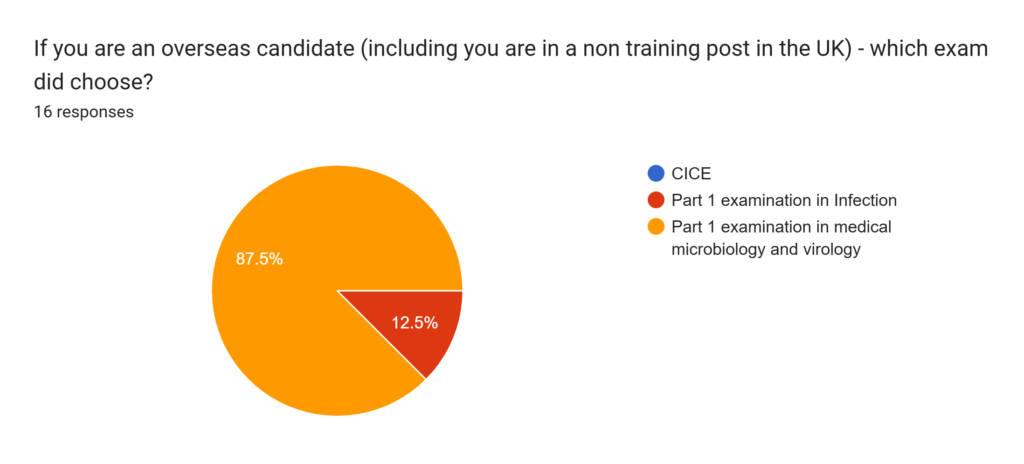
What should I take to the exam with me?
If you are completing the examination on paper, you will need to bring:
- Identification including a photograph (e.g. passport, driving licence or national identity card). NHS cards are not valid.
- Stationery including scientific calculator without internet connectivity in a clear pencil case or bag
- Analogue watch or other timer without internet connectivity or make a noise
- Drinks and snacks that are not disruptive
- Extra layers (jacket/coat etc) as RCPath cannot guarantee the temperature of the examination venue
Q3. Do I need a sponsor? Who can be my sponsor?
When you apply, you will need a sponsor. For trainees in the UK training programme, it is your educational supervisor.
According to RCPath, a sponsor should be your educational supervisor, the head of the department, or someone with a similar level of involvement in your training. Ideally, he/she should be a fellow of the college. However, a college fellowship is not compulsory. So:
1. Your head of the department Or
2. Someone who supervised your training Or
3. Your microbiology head of the department of your college etc
You can find the form:
- Sponsorship-form-for-exam-candidates-PDF-version.pdf OR
- Sponsorship-form-for-exam-candidates-Word-version.docx OR
- check here - Examination applications
Q4. How long would I need to prepare for this?
This is a difficult question, as every person is different in terms of how much background knowledge you have and how much time you can spend. However, if I have to hazard an estimate:
- If you are a UK candidate, then you will need at least 3 months of good, dedicated preparation. Six months is safe.
- If you are an overseas candidate, a minimum of 6 months is required, but I strongly recommend 1 year.
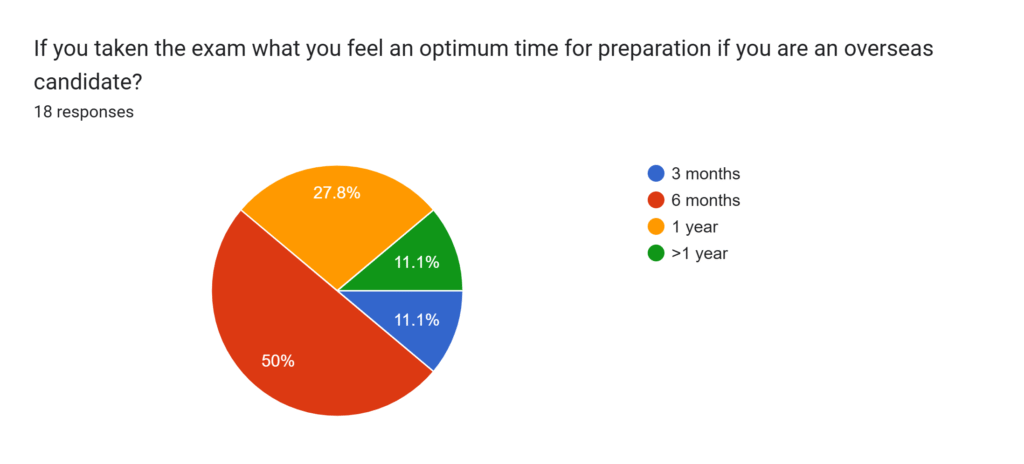
Q5. Do I need to take the IELTS or OET for the FRCPath examination?
No, you don't need IELTS or OET
Q6. Do I need GMC registration for the FRCPath exam?
No.
GMC registration is not needed for this exam.
Q7. Do I need to travel to the UK for this examination?
No. Not for part 1. It is an online exam, and you can take it from your home. RCPath will guide you through the process.
You have to travel to the UK for Part 2 FRCPath.
The online platform provider for this exam is called TestReach. Testreach will send a registration email to candidates at least a week before the examination date; candidates must register with Testreach and schedule their time at least 78 hours in advance of the exam date to ensure they will be able to sit. The platform may change in future.
Make sure you keep your photo ID card (like a passport) with you.
Q8. Is there a curriculum/syllabus for this exam?
Yes.
It is the RCPath curriculum. You can find it here –
https://www.rcpath.org/trainees/training/training-by-specialty/medical-microbiology-2021.html
I have made a summary of the curriculum. You can download it here. Go to file, make a copy or download-
https://docs.google.com/spreadsheets/d/1Oj7lTeodg5CBvE6x2p4Vhtk8gDQCqO2rxWpsEObHnUo/edit?usp=sharing
Q9. Which books should I read?
- Oxford Handbook of Infectious Diseases and Microbiology - a MUST-Read for this exam.
- Infectious Diseases, Microbiology and Virology: A Q&A Approach for Specialist Medical Trainees - A large number of MCQs to practice
- Tutorial Topics in Infection for the Combined Infection Training Programme - more than 150 MCQs to practice
- Microbiology Nuts & Bolts: Key Concepts of Microbiology & Infection - examinees still use it but it is 12 years old, so I would use it carefully
Infection control and statistics
- Manual of Infection Prevention and Control - Dr Damani's book is a traditional favourite OR
- Oxford Handbook of Medical Statistics (Oxford Medical Handbooks) - You need to know some statistics for part 1 and a lot more for part 2. get a medical statistics book of your choice. Some examinees have used this book.
Optional - some trainees have used additional books. I consider them optional
- Mims' Medical Microbiology and Immunology
- Medical Microbiology by by Patrick R. Murray
- Jawetz, Melnick & Adelberg's Medical Microbiology
Time is limited, hence choose carefully. You have to read many other guidelines, SMI, EUCAST etc.
Microregistrar.moodlecloud.com
This is a collection of materials which include chapters written keeping this exam in mind - bacteriology, virology, mycology, parasitology, antibiotic, infection control, laboratory medicine, statistics, vaccine, high yield notes and >400 MCQs. You can find more information here
- https://docs.google.com/spreadsheets/d/1XzlEPyzUM3ljxjzMrxpXLH-Pu_xTlWGC8AtrlRzp5Zw/edit?gid=831519701#gid=831519701
Q10. Where can I find questions?
RCPath past papers
- https://www.rcpath.org/trainees/examinations/examinations-by-specialty/medical-microbiology.html
- https://www.rcpath.org/trainees/examinations/examinations-by-specialty/infection.html
BIA learn infection
- https://learn.britishinfection.org - MUST use
Microregistrar moodlecloud
- Over 400 MCQs
Books
- Infectious Diseases, Microbiology and Virology: A Q&A Approach for Specialist Medical Trainees
- Tutorial Topics in Infection for the Combined Infection Training Programme
Other questions
- MRCP infection questions, USMLE questions - There are many books and online resources for these two exams, and you can consider solving these papers. However, remember that these exams are aimed at different populations, and the standards are different. This is especially true for USMLE, as the problems are often different and the guidelines they follow are not necessarily UK guidelines.
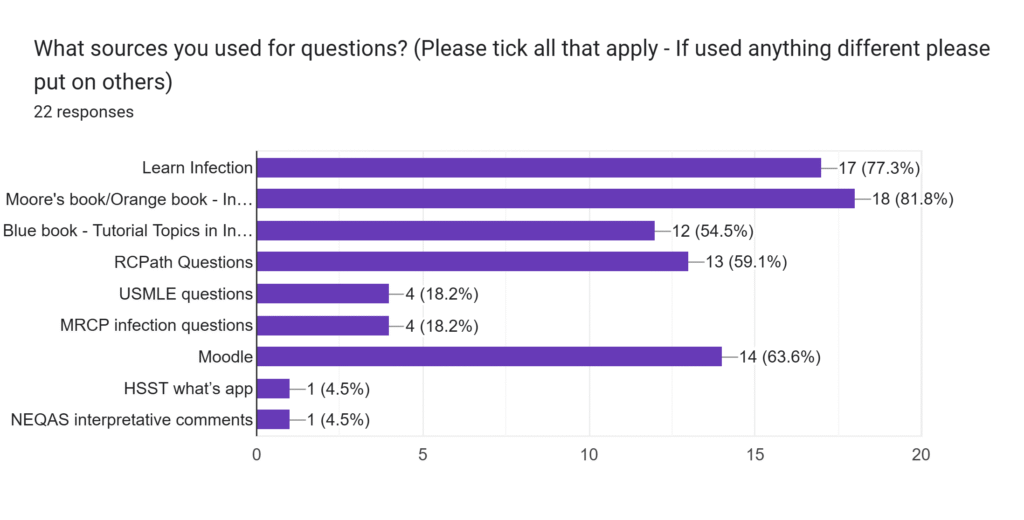
Q11. Are there any courses available?
There is a lack of course specifically arranged for this examination. Our survey showed
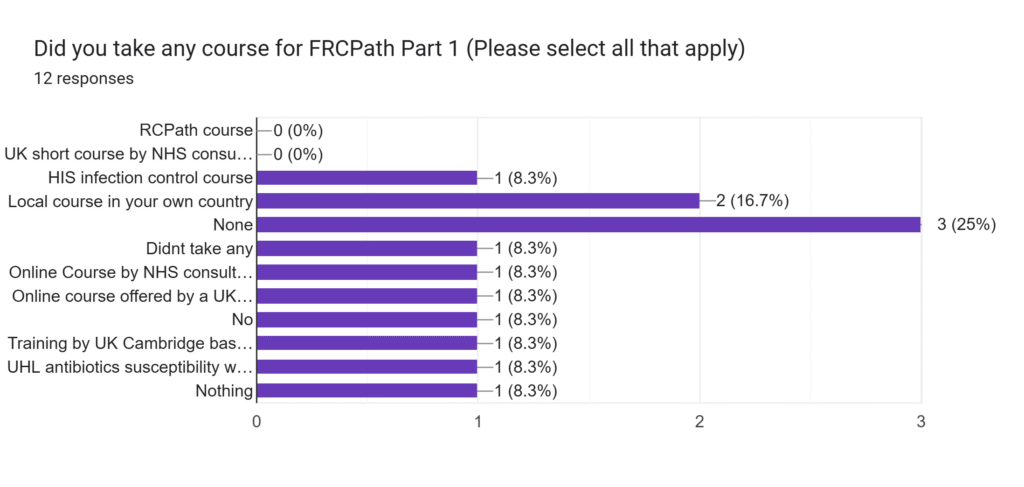
Microregistrar-Microquora course
Hence, we decided to make a course based on our experience from Moodle - It is going to be held in Hyderabad, India (6-7th December 2025). - More information here - https://drive.google.com/file/d/1tk3APC7KDNt1v_mYT50spg1gR4gsT8VQ/view?usp=sharing
You can register here - https://docs.google.com/forms/d/1emgM0Gy23DuQxf_qD1vyxhhJ44JgAGib2r1Ff0p2B1Q/edit
You can email for more information here - frcpathpreparatorycourse@gmail.com
Q12. What other resources should I use?
This is what a large number of past candidates suggested.

Find all the links here -
- UKSMI - UK Standards for Microbiology Investigations
- NICE guidelines: Published guidance, NICE advice and quality standards | Guidance | NICE
- Greenbook vaccine - Immunisation against infectious disease - GOV.UK
- EUCAST has many documents. At least read these:
- Other UK guidelines (some are generic, like RCOG - only read those related to infection)
- Published and Reference Guidance | British Infection Association (BIA)
- Guidelines and guidance by topic - Healthcare Infection Society
- Current Guidelines
- Guidelines | BASHH
- Green-top Guidelines | RCOG
- Gastroenterology and Endoscopy Guidelines | BSG
- Guidelines | British Thoracic Society | Better lung health for all
- SaBTO - ODT Clinical - NHS Blood and Transplant
- SaBTO microbiological safety guidelines - GOV.UK
- SaBTO reports and guidance documents - GOV.UK
- Guidelines & Standards - British Transplantation Society
- BOA Standards for Trauma and Orthopaedics (BOASts)
- Creutzfeldt-Jakob disease (CJD): guidance, data and analysis - GOV.UK
- NHS England » Health technical memoranda
- UK CVN guidelines – http://www.clinicalvirology.org/guidelines/
- British Society of Rheumatology – https://www.rheumatology.org.uk/practice-quality/guidelines
- British Society of Haematology – https://b-s-h.org.uk/guidelines/
- Guidelines.co.uk – https://www.guidelines.co.uk/
- Viral rash in pregnancy - GOV.UK
- UKHSA documents - UKHSA is a massive resource for microbiologists/infection specialists. It is also the most up-to-date resource. It is, however, so vast that it is not always easy to find what you are looking for. I suggest you start from the A to Z link I shared, but always, when reading a subject - Google "your subject name" + "UKHSA".
- UK antibiotic guidelines: If you are from overseas, you can benefit from having UK antibiotic guidelines. I suggest looking at the NHS Trust guidelines using
- BNF - BNF (British National Formulary) | NICE
- Infection control
- Journals
- Laboratory safety and quality
- ACDP - Search - GOV.UK
- https://www.hse.gov.uk/pubns/clinical-laboratories.pdf
- https://www.hse.gov.uk/biosafety/laboratories.htm
- https://www.hse.gov.uk/biosafety/management-containment-labs.pdf
- Quality manual – https://mft.nhs.uk/app/uploads/2021/02/Manchester-Quality-Manual.pdf
- Hospital safety – https://www.aintreehospital.nhs.uk/media/11602/ii-health-safety-policy-ii-gen-pol-2-v2.pdf.
Q13. Will working in the UK or a clinical observership improve my chances of passing the examination?
Certainly, you will know our common problems and how we manage them. This knowledge is invaluable. However, you must balance this advantage with the expense and difficulty of getting such a post.
I know many candidates who passed the exam without working in the UK. You have to be thorough and diligent. In my experience, being active in the forums (WhatsApp, Facebook) is important. Ask questions, and clear your doubts. Making a mistake in the forum is much better than making it in the exam.
Q14. How do I apply, fees, etc
Please read these pages carefully.
- Apply and pay online: https://www.rcpath.org/trainees/examinations/exam-apply-and-pay-online.html
- FAQ: https://www.rcpath.org/trainees/examinations/regulations-and-guidelines/frequently-asked-questions.html
- 2025 regulations: https://www.rcpath.org/trainees/examinations/regulations-and-guidelines/regulations-guidelines-and-policies.html
You will find answers to a lot of questions on this page
- How and when to apply.
- Fees and payment methods
- When will you find the date of the exam?
- How will you get your result?
There is also a section on that page for overseas candidates - "Additional Information for Overseas Candidates". Read it carefully.
Q15. I am an overseas graduate. During the application process, what should I select in the registration section?
If you have GMC registration, choose GMC.
If you don't, choose "other" and write the registration number you have in your country from your medical council.
Q16. Will passing the FRCPath part 1 help me get a job in the UK?
Yes and no.
To work in the UK as a doctor, you must have GMC registration. Passing FRCPath part 1 will not grant you that. The best place to find out whether you need registration and which route is GMC.
Take this test: https://www.gmc-uk.org/registration-and-licensing/join-our-registers/registration-applications/application-registration
Typically, as an overseas microbiologist, you will need either the PLAB route, full FRCPath or sponsorship/MTI.
Once you have GMC registration or are eligible for it, you need to find a job and send your application. Jobs can be found in NHS jobs or Trac jobs, or BMJ. You can also find jobs via recruitment agencies, but ensure you find a reliable one. Once you have applied, you will go through a shortlisting process. This is where your part 1 FRCPath will be useful, as you will get an advantage over those who do not have FRCPath part 1. If shortlisted, you will have an interview. Microregistrar has a WhatsApp group where you can ask questions if you have any. You can ask to join this group via our Facebook group.
Q17. Do you have any additional tips to share?
- You must get as much help as possible if you are from outside the UK. Use social media, but cautiously.
- Learn about the exam well. How many questions, types of questions, how long will you get, what are the guidelines and recommendations for the exam, and what type of exam setting does RCPath suggest? Make sure there is nothing unexpected about the exam before the day you sit for it.
- Read the curriculum—make sure you list topics to read. Unless you do, you may forget something.
- Read the Oxford handbook thoroughly. It is your base. You must read it at least 2 - 3 times, every line. Supplement each topic of the Oxford Handbook with additional notes from guidelines, SMI, EUCAST, microregistrar moodle (if you subscribed)
- Do questions - past papers, learn infection, Moore's book, tutorial topic and moodle. Do each of these more than once. When doing questions, time yourself. I suggest 1 minute max for 1 question.
- When you do questions, try to pick up the hints in the stem to help you reach the answer. These hints are important. Highlight these hints in your book (Oxford/your note) or write down against the topic.
- Remember, this is a UK exam. Questions are based on UK problems; answers are expected to reflect how we manage cases in the UK. Even if you do something entirely different in your country, that will not be applicable here. Read UK guidelines and books. You can read US-based guidelines, but beware: US practice, in some cases, is different from the UK. Don't read CLSI, use EUCAST.
- Make your notes. When revising for the second time, it is easier to read your notes than the book. However, if your prep strategy is different, use that.
- Make a study group or study partner. You can discuss the subjects you read. Your partner might help you pick up points that you have missed.
Useful Links
- rcpath MTI - Google Search
- Sponsorship Scheme application form
- SAS Doctors
- https://www.nhsemployers.org/publications/working-and-training-nhs
- https://www.gmc-uk.org/registration-and-licensing/join-the-register/before-you-apply/working-as-a-doctor-in-the-uk
- Search Results (rcpath.org)
- https://www.rcpath.org/profession/employing-pathologists/employing-bodies-information-for-the-rcpath-sponsorship-and-mti-schemes.html
- Medical Microbiology SSG
- Frequently Asked Questions
- https://www.rcpath.org/static/a107309f-c449-4c6e-98fa4257fa5b6924/04d458e7-01dd-4371-b4c39794a1a5d2b6/Examinations-Regulations-and-Guidelines-2025.pdf
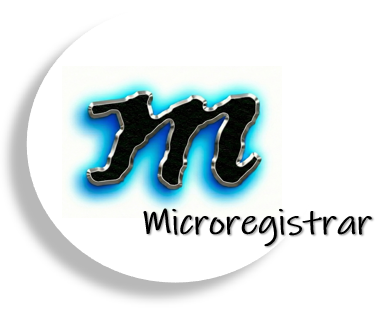
Where I can find a group of partners and colleagues for the exam?
If you are in the UK - it is someone from your region, or you can also make a group with trainees from another region.
If you are outside the UK - it is slightly tricky. You have to join various Facebook/WhatsApp groups and find some people who are willing to work with you. Most of the time, groups do not work as people are unwilling to contribute and are only too happy to take. So ensure you contribute and encourage others to contribute as well.
You may encourage one of your colleagues near you to take the exam with you.
People usually find a study partner from their own training school. If you cannot than use social media - facebook, whatsapp groups etc. People are often reluctant as they believe the people in the group will only take and not contribute. So you need to show your value as a study partner. Be active in the group, post helpful content, answer other people's questions to gain trust. If you just say, "Is anyone willing to be a study partner to me?", you are unlikely to get one.
Sir, I'm a post graduate trainee of microbiology from India. I'll complete my MD in 2025. Can you kindly guide how to go about it, whether IELTS is needed while I apply for FRCPATH.
Thank you
You don't need IELTS for FRCPath. IELTS is needed for PLAB, i.e. if you planning to get GMC registration to work in the UK.
Can an IMG with IMC registration and MSc Clinical and Molecular Microbiology who has not worked as a doctor take FRCPath with 12 month postgraduate academic Masters degree training? Will it be CICE or Part 1 Infection?
If you have a microbiology-related post-graduation degree, I believe it will be OK. We have HSST trainees who are not doctors taking the exam. You are likely to follow their route. However, please know the RCPath is the one who will decide it. I know that RCPath contact people for more information when needed.
In that case, it will be part 1 of microbiology and virology. You can also take FRCPath in Infection (CICE is the same exam, but the name is different, and it is for UK trainees).
You will need 1 year of training for part 1 and 2.5 years of training for part 2.
Hi ,
I am planning to take the exam on 2026 autumn. Are there anyone who is interested in joining to study with me? please reply.
Hi ,
Looking for some one serious about writing the exam next year. Are there anyone who is interested in joining to study with me? please reply.